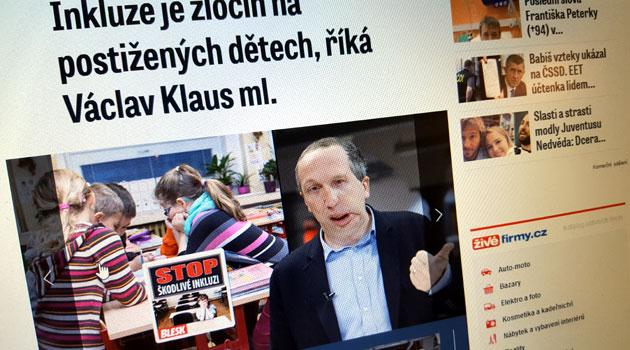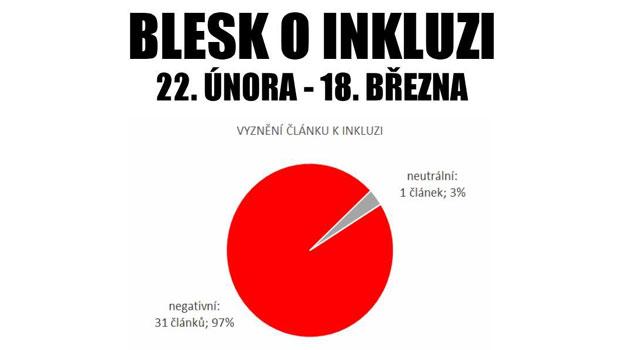Tabloid interview with son of former Czech President about inclusive education features untruths

The Czech tabloid Blesk has published an interview with Václav Klaus, Jr., the son of the former Czech President who was once the principal of a private high school in Prague, featuring the headline “Inclusion is a crime against disabled children”. Tomáš Hečko, who is the parent of a child with Down Sydrome and a media professional, has reviewed the piece.
Hečko notes that Klaus, Jr. is rumored to be a candidate for Education Minister in the future, which he finds difficult to believe and says would constitute a catastrophe. He considers it necessary to correct the following three statements made in the interview that are basically untrue.
1) Václav Klaus, Jr.: “The children who are physically disabled have already been attending schools here for quite some time. Inclusion did not have to be introduced for their sake.”
In reality: According to data from the Statistical Yearbook of the Czech Education Ministry that has been analyzed by Czech Radio, last year in Prague, for example, just 52.3 % of children with physical disabilities were enrolled into mainstream education, while in Liberec Region 58.% % of them were and in Ústecký Region 69.6 % of them were.
2) Václav Klaus, Jr.: “This is a crime because our practical schools were world-class and arranged for the vast majority of pupils to be apprenticed and more than half of them then found work. Naturally they did not then do nuclear physics, they worked somewhere in a factory, but they took home their pay and were part of society. Through these measures, we are now taking away their hope of any success in life…“.
In reality: The intentionally misleading formulation of this statement suggests that children who graduate from inclusive education have less of a chance of asserting themselves on the labor market that others. Actually, children with disabilities who have graduated from an inclusive primary school regularly continue to educate themselves according to their capabilities (for children with mild mental disabilities this is usually in apprenticeships) and their chances on the labor market are subsequently comparable to those of their peers who attend special school.
3) Václav Klaus, Jr.: “(…) because instead of having seven hours of practical training, which is what they had at the practical schools, they are now at a normal primary school, where they have foreign language instruction. All they are able to do is recognize that the language is foreign. There is nothing else to call that but a crime.”
In reality: This intentionally misleading formulation suggets that children with mild mental disability cannot learn a foreign language. However, the capacities of children with mild mental disability are very individual in this respect.
For understandable reasons, I primarily know about the situation of children with Down Syndrome. Their capability to speak and use language is usually (for many reasons) somehow limited.
Nevertheless, there are many cases of children with that diagnosis who do speak more than one language, whether they come from a bilingual environment or learn a foreign language at school to a degree corresponding to their capacity. This link is to an article telling the story of Magda Vaňková, a girl with Down Syndrome who graduated from a mainstream primary school that included English language instruction.
